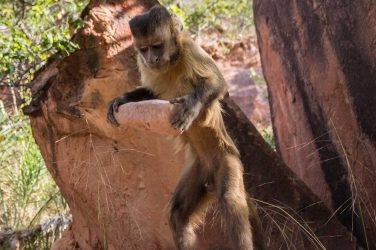Religious leaders from around the world are meeting for the first time with conservationists and scientists in Norway this week to develop the ethical case for protecting tropical forests.
“There is a dimension to this fight that will require a global, tectonic shift in values,” said Vidar Helgesen, Norway’s Minister of Climate and Environment, in a statement. “It is not the realm of policy, commerce or science, but of spirit, faith and moral conviction.”
The event marks the launch of the Interfaith Rainforest Initiative. From June 19 through 21, heads of various religions, including Judaism, Islam, Christianity, and Hinduism, are sitting down with government officials, indigenous leaders, and NGO representatives to hammer out a roadmap for rainforest conservation at the Nobel Peace Center.
The aim is to address the massive loss of forest happening every year, equivalent to an area the size of Austria according to the organizers of the conference, by leveraging the growing sentiment in many of the world’s spiritual and religious communities that we all have an obligation to protect these areas.
“The world’s religions, each in its own unique way, ground a moral call to action to protect tropical rainforests,” said William F. Vendley, the secretary general of Religions for Peace, in the press release.
“Through multi-religious partnership, the wisdom of each religious tradition can be a resource to help us to cultivate the values and virtues essential for harmonious interactions with each other and our common home, [Earth].”
Worldwide, rainforests play a vital role in the daily lives of 1.6 billion people, say the lead organizations, laying out a clear need from a social justice standpoint to ensure that those forests will still be standing in the future.
“The world’s religious and faith communities have a unique capacity to raise awareness and understanding of our responsibility to protect these vital ecosystems,” said Achim Steiner, administrator of the UN Development Programme (UNDP), in the statement, “and thus an important voice in a growing coalition of governments, companies, indigenous peoples’ groups and NGOs that have committed to ending deforestation by 2030.”
UNDP, along with Rainforest Foundation Norway and Norway’s International Climate and Forest Initiative, organized the discussion, to be held through June 21. Norway has made a big push to back efforts such as reducing emissions from deforestation and forest degradation in developing countries – or REDD+ – with $3 billion in financing over the past 10 years.
Many experts have noted a rise in the global awareness of environmental issues recently, as leaders such as Pope Francis, the head of the Roman Catholic Church, have supported a faith-based role in protecting the environment.
The pope’s 2015 encyclical Laudato Si codified a spiritual argument for addressing climate change because of its impact on the world’s poor. Other leaders point out that their faiths also call for stewardship of the Earth.
“Islam teaches the principle of unity of existence that implies a triangle of harmony among God, Man and Nature,” said Din Syamsuddin, chairman of the Indonesia-based Center for Dialogue and Cooperation Among Civilizations, in the statement. “Conserving rain forest is indeed a part of keeping that balance for the well being of both Nature and Mankind.”
Rabbi David Rosen, who is the International Director of Interreligious Affairs of the American Jewish Committee, pointed to the Garden of Eden in Genesis in Judaism’s Bible, which is also the first book of the Christianity’s Old Testament.
“To fail to ensure the health and strength of the forests is not only to imperil humanity’s future,” Rosen said. “It is to fail the Divine charge to humanity to protect the Garden of our world.”
But participants in Oslo also pointed out that a prominent place for nature in peoples’ faiths is nothing new, and that global leaders would do well to support the long-standing efforts of forest communities to safeguard their environment.
“Tropical rainforests occupy a sacred place in many faiths, religions and spiritual traditions,” said Mary Evelyn Tucker, who directs the Forum on Religion and Ecology at Yale University.
“Indeed, spiritual reverence for nature and all life can be found across the world’s religions, including among Indigenous Peoples and other residents of the world’s tropical rainforests.”
Leaders representing indigenous communities from the forests of Southeast Asia, the Amazon and Africa were in attendance. Several experts recognized their unique contribution to forest health, the knowledge that they can contribute going forward and their sometimes-precarious position as frontline defenders of the forest.
“We would like to direct this emerging interfaith movement to focus on the besieged indigenous communities that have protected these forests for thousands of years,” said Lars Løvold, the director of Rainforest Foundation Norway, in the statement.
“The systematic destruction of tropical forests is often accompanied by land grabs and even outright murder. We need to secure the rights of forest peoples, and listen to their voices in national and international policy debates.”
Attendees said that they hoped that the talks in Oslo will spur lasting cooperation with the goal of ending deforestation, protecting biodiversity and ensuring that forests are there to provide for both the basic needs of local people and the climate-change-mitigating force on which all of us depend. Plans are in progress for having another interfaith summit in Brazil in 2018.
“The world’s rainforests are a stunning example of the life-sustaining beauty of the planet; they are spectacular, vital to life, and at grave risk,” said Reverend Fletcher Harper, the executive director of the interreligious coalition GreenFaith.
“This meeting represents a tremendously important first step forward for faith communities, who must join First Peoples and commit to rainforests’ health and restoration.”
Mongabay






